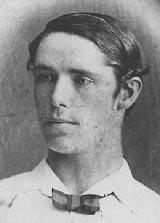Related Research Articles

Arthur Fitzgerald Kinnaird, 11th Lord Kinnaird, was a British principal of The Football Association and a leading footballer, considered by some journalists as the first football star. He played in nine FA Cup Finals, a record that stands to this day. His record of five wins in the competition stood until 2010, when it was broken by Ashley Cole.

The Old Etonians Association Football Club is an English association football club whose players are alumni of Eton College, in Eton, Berkshire.

Cuthbert John Ottaway was an English footballer. He was the first captain of the England football team and led his side in the first official international football match.
Charles Henry Reynolds Wollaston was an English footballer who played as a forward for Wanderers and England. He won the FA Cup five times with Wanderers, becoming the first player to do so. Wollaston was born in Felpham, Sussex and died in Westminster.

The 1877 FA Cup final was a football match between Wanderers and Oxford University on 24 March 1877 at Kennington Oval in London. It was the sixth final of the world's oldest football competition, the Football Association Challenge Cup. Wanderers were the reigning cup-holders and had won the competition three times in total. Oxford had also previously won the tournament, making this the first FA Cup final played between two former winners. Wanderers had reached the final without conceding a goal, defeating Cambridge University in the semi-finals. Oxford had only played three matches in the five rounds prior to the final due to a combination of byes and opponents withdrawing.
Francis Hornby Birley was an English footballer who played as a half back. He won the FA Cup three times in the 1870s and made two appearances for England in 1874 and 1875.
William Lindsay was an English amateur footballer who, generally playing as a full back, helped the Wanderers win the FA Cup in 1876, 1877 and 1878 and made one appearance for England in 1877. He also played cricket for Surrey between 1876 and 1882.
Harrow Chequers Football Club was a football club from London, England in the 1860s to early 1890s. It played as the Harrow Chequers from 1865 to 1876, when it was then renamed the Old Harrovians, and continued play until at least 1891. Derived from former pupils of Harrow School, the club was involved in the formation of the FA Cup in 1871. It was slated to play in three of the first six FA Cup competitions in the 1870s, but they forfeited each time, and never contested an FA Cup match as the Chequers. One of their players, however, Morton Betts, is remembered for scoring the first goal in the first ever FA Cup Final in 1872, which is essentially all that is remembered today of the club. However, as the Old Harrovians, the team had some more success, including reaching the semifinals of the 1877–78 FA Cup.
Revd. Charles Maude Meysey-Thompson was an English clergyman who, as an amateur footballer, won the FA Cup in 1873 with the Wanderers. He also played in the 1876 FA Cup Final for the Old Etonians and for the Scottish XI in the last representative match against England in 1872.
Gitanos Football Club was an English association football club and one of the first members of the Football Association.
John Barrington Trapnell "JB" Chevallier was an English amateur footballer who played as a forward for Old Etonians, before taking over the family business, Aspall Cyder.
Harold De Vaux Brougham was an English amateur footballer who played for Clapham Rovers in its 1880 FA Cup Final win.
Matthew George Farrer was a footballer and barrister, who won two FA Cup runners-up medals, and who also had great success in rowing.
Charles Edward Farmer was a footballer and solicitor, who won an FA Cup runners-up medal.
Francis Heathcote Wilson was an association footballer and barrister who played in the 1875 and 1876 FA Cup finals.

Thomas Astley Horace Hamond was an association football player and solicitor, who won an FA Cup runner-up medal in 1875.
The Rev. Edward Hugh Alington was an English footballer and Church of England vicar, who played in the 1877 FA Cup final for Oxford University.
Evelyn Waddington was a Welsh footballer and cricketer, who played in the 1877 FA Cup final for Oxford University.
The Rev. Philip Fernandez was a footballer who played in the 1877 FA Cup final for Oxford University.
Henry Otter was a footballer who played in the 1877 FA Cup final for Oxford University.
References
- ↑ "dodd". ancestry.
- ↑ Foster, Joseph (1885). Men-at-the-bar. London: Hazell, Watson, and Viney. p. 467.
- ↑ Eton Register Part III 1862–68. Eton: Spottiswoode & Co. 1906. p. 89.
- ↑ Foster, Joseph (1891). Alumni oxonienses : the members of the University of Oxford, 1500-1886 Volume 3. Oxford: Parker & Co. p. 1422.
- ↑ "Eton College v Gitanos". Sportsman: 5. 30 November 1872.
- ↑ "Eton College v Oxford XI". Field: 490. 8 November 1873.
- ↑ "Oxford University v University College". Field: 520. 6 November 1875.
- ↑ "Wanderers v Oxford University". Field: 732. 16 December 1876.
- ↑ "Oxford University v 105th Regiment". Sportsman: 3. 15 December 1876.
- ↑ "Oxford University v Upton Park". Sportsman: 4. 12 March 1877.
- ↑ "Wanderers v Oxford University". Sportsman: 4. 26 March 1877.
- ↑ "Football". Evening Mail: 9. 12 February 1877.
- ↑ Foster, Joseph (1885). Men-at-the-bar. London: Hazell, Watson, and Viney. p. 467.
- ↑ Marriages registered in October, November, and December 1883. London: HMSO. 1884. p. 299.
- ↑ "Births". Belfast Newsletter: 1. 12 August 1884.
- ↑ "Deaths". Newbury Weekly News: 5. 4 September 1884.
- ↑ Calendar of all grants of probate and letters of administration: S. T. Birkenhead: HMSO. 1951. p. 952.